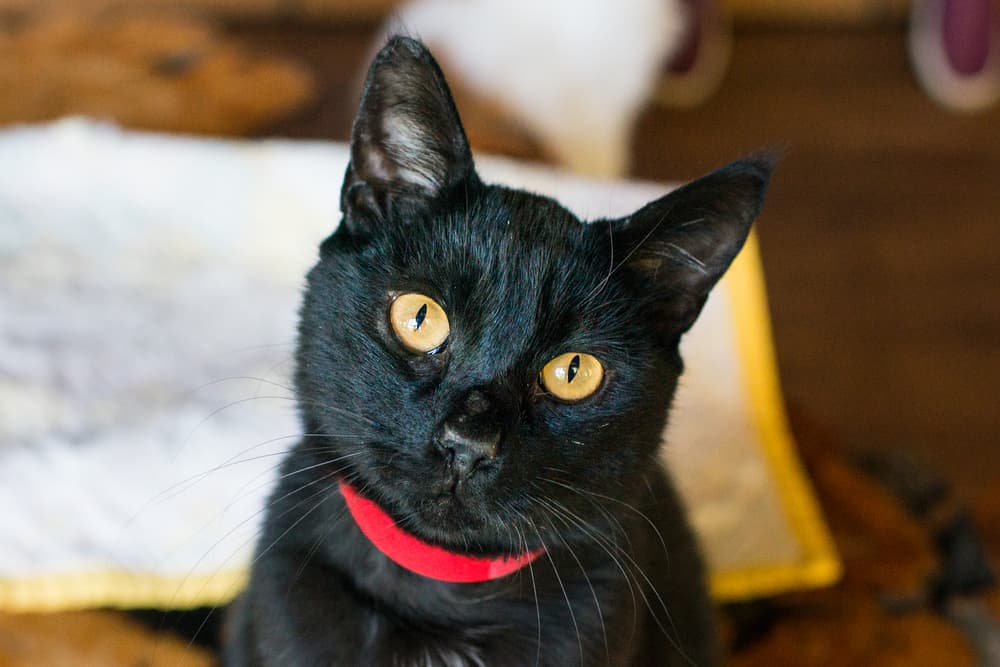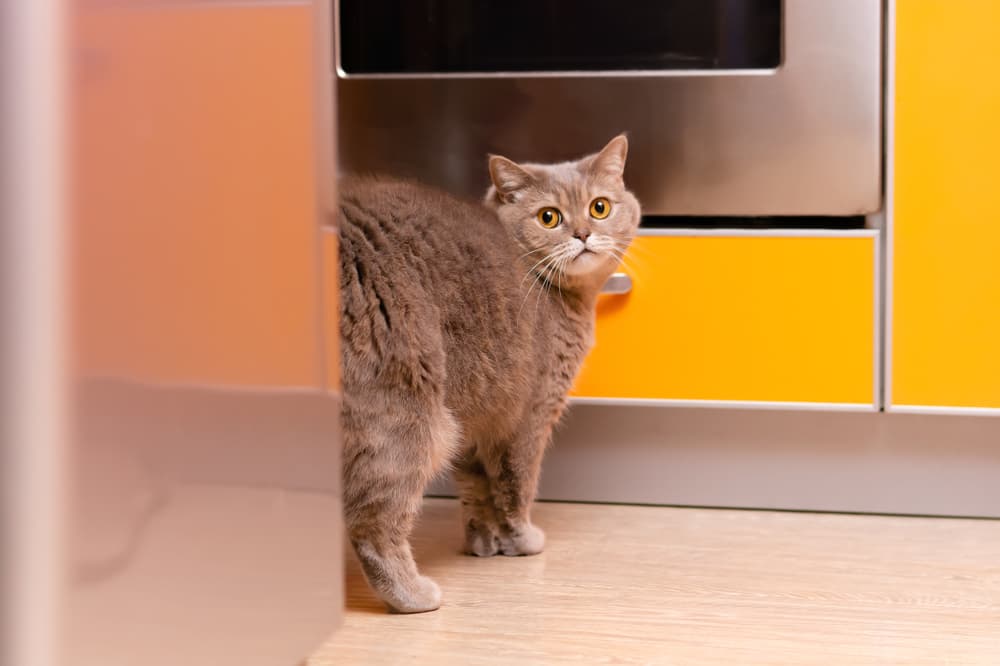Cat Spraying: Why It Happens and How to Stop It

The urine staining and pungent owner from cat spraying is a source of angst for many pet parents. But this same frustrating behavior is also a survival technique for your cat. Cats spray to find mates, claim territory, and respond to perceived threats.
How can you stop it? The first step is to understand the problem. We’ve compiled everything you need to know about cat spraying, so you can stop the behavior in its tracks.
Why Do Cats Spray?

Spraying urine is how cats communicate with each other. “Cats prefer to avoid physical confrontations whenever possible so they often use scent communication to relay messages,” says Pam Johnson-Bennett, a certified cat behavior consultant and owner of Nashville-based Cat Behavior Associates. “Cats are master communicators and scent is one of the most important methods for them.”
Sprayed urine contains pheromones, the chemical that facilitates this communication. Pheromones “tell other cats vital information about the sprayer, including status, sex, mating availability, and territorial claims,” says Bennett.
Changes in a cat’s environment can also lead to spraying, says Dr. Lisa Goin, a veterinarian with Heart + Paw in Glen Mills, Pennsylvania. “Spraying that is occurring near doors or windows can indicate an outside stressor such as seeing other cats outside,” she says. “Spraying in other areas of the home can indicate stressors from inside the home such as new pets, people, and construction.”
In multi-cat households, competition can cause anxiety that leads to cat spraying. Some studies suggest that the likelihood of spraying increases in proportion with the number of cats in the home.
Do Litter Box Setups Contribute to Cat Spraying?

Cat spraying often has little to do with the litter box itself, says Bennett. This is why a spraying cat may still use the litter box for elimination. “Spraying is usually the result of some environmental dynamic. Cats who spray may also regularly use the litter box for normal urination and defecation.”
The difference is the location of the urine. Puddles of urine on furniture or rugs are more likely to point to litter box problems. Urine on vertical surfaces like walls and furniture is more likely about communication.
If you have a multi-cat household, cats may spray if there aren’t enough litter boxes present. Aim to have one litter box per cat, plus one more one to help relieve stress or territorial issues.
Do Male Cats Spray?
Intact males will spray because they’re ruled by their hormones, says Bennett. “Spraying may help males avoid physical confrontation which could lead to injury. Males may also spray in an unfamiliar environment. Spraying is the safest form of exchanging information.”
Intact males use spraying to mark their territory.
Do Female Cats Spray?
Spraying is more common in males, but some intact females will spray as a normal mating behavior.
Female spraying shares many similarities with male cat spraying. “A female may spray to let males know her mating availability status,” says Bennett. “Females may also spray when feeling threatened or in an unfamiliar environment.”
Do Neutered Cats Spray?

Neutering may reduce the likelihood of spraying, but it’s not a guarantee. It’s estimated that about 10 percent of neutered males and 5 percent of spayed females continue to spray. If your cat is already spraying, sterilization surgery may not get rid of the problem. This is especially true if they’ve been practicing the behavior for a long time.
Spraying from a neutered cat may be a warning sign that he feels threatened, says Bennett.
“It could be that you’re rushing a new cat introduction or that you’re missing the building tension in your multi-cat household. It could even be that the new furniture you bought has an unfamiliar scent and your cat needs to establish it as part of the territory. The bottom line is that you need to determine the cause in order to effectively address the behavior.”
Cat Spray Vs. Pee: What’s the Difference?

Cats pee to eliminate waste. Soiling issues like peeing right outside the litter box are usually due to a poor litter box setup, underlying diseases, cognitive decline, or old age. Sometimes, it can even be a cry for help. Though some of these can contribute to spraying, cats generally spray to communicate mating status, establish territory, and respond to anxiety.
There are tangible ways to tell the difference between cat spraying and peeing. Use the following signs are guidelines. If you’re unsure, it’s best to have your veterinarian make a proper diagnosis.
Is it a Squirt or Stream?
A cat who sprays will produce a smaller amount of urine compared to regular elimination. Put into perspective, healthy adult cats normally produce 28 milliliters of urine every 24 hours. In contrast, sprayers usually squirt less than two milliliters.
Does the Pee Land on the Floor or Wall?
Goin says sprayers usually aim for vertical surfaces like walls, fences, or chairs. Cats with inappropriate urination issues, she says, will usually pee on horizontal surfaces. This is not a hard and fast rule, though. Some cats will occasionally spray on horizontal surfaces.
Is the Cat Standing or Squatting When He Pees?
A cat usually stands to spray on a vertical surface, while a cat who’s eliminating will squat, Goin says. Another sign that a cat is spraying is that he will often turn his arched back to the target then raise and shake his tail.
Spraying Smells Worse Than Regular Cat Pee
The cat spraying smell from an intact male is more pungent than female and neutered male urine. This is because “intact male cats have higher levels of hormones (like testosterone) in their system compared to neutered male cats, so that is why their urine smells stronger,” explains Goin.
A neutered cat’s urine can stink, too, but not for the same reason. “With neutered and spayed cats, the reason the smell is more noticeable to cat parents is because it is often deposited on objects repeatedly where it stays and dries, for example, against a wall or piece of furniture,” says Bennett. “After a few repeated visits to the same area, the dried spray becomes quite offensive to the human nose.”
When Do Cats Start Spraying?

You may notice your cat start to spray when he reaches sexual maturity. For most cats, that mark is usually around 6 months of age, says Bennett.
When cats reach social maturity around 2 years old, they may begin challenging each other. “Spraying may start to be seen at that time,” says Bennett.
A cat can spray at any age, however. “Any change in the environment that causes a cat to feel threatened or concerned can result in spraying at any age in an adult cat,” says Bennett.
How to Stop a Cat From Spraying

It’s important to rule out medical issues (like cystitis) before looking to behavioral modification.
If your vet does not diagnose your cat with a medical condition, you can try the following tips to help stop a cat from spraying.
Consider Neutering or Spaying Your Cat
Neutering or spaying a cat is the best way to reduce spraying behavior, says Bennett. “If a cat hasn’t been neutered or spayed, talk to your veterinarian about when this should be done. If a male cat isn’t neutered then it will forever be a losing battle to combat spraying.”
Provide a Stable Home Environment
Cats don’t like change, says Bennett. “They take comfort in familiarity and their social structure is built around the availability of resources.” Sometimes change is unavoidable—work schedules rotate, people move out of the house, or you adopt a new pet. However, “Keep these things in mind so you can provide the most security and emotional comfort for your cat,” adds Bennett.
Examine Your Litter Box Setup

Though spraying is not an elimination problem, providing an attractive litter box setup can reduce conflicts. This can help reduce anxiety, especially in multi-cat households.
Veterinarians recommend maintaining one litter box per cat plus one more. So a home with two cats would need three litter boxes, and a three-cat household would need four boxes. The litter boxes should be large enough for a cat to move freely and stay in quiet areas. The type of litter you use is important, too; cats tend to like soft, unscented clumping litter.
If you have a multi-level home there should be at least one litter box per level that your cat has access to.
Reduce Your Cat’s Anxiety Level
Removing or reducing stressors can help reduce cat spraying. Inside the home, synthetic pheromones such as Feliway can reduce anxiety,” Goin says. Pheromone diffusers contain synthetic chemicals that mimic natural pheromones. They’re easy to use: just plug it into an electrical outlet and replace the cartridge regularly.
If your cat becomes anxious from seeing cats outdoors, experts recommend preventing visual access. Draw your blinds, use a motion-activated sprinkler, or use other deterrents.
Deep Clean Soiled Areas

Cats will return to marked areas, so cleaning up any remnants can prevent spraying in that area. “Any urine marked areas should be cleaned regularly with an enzymatic urine cleanser to reduce the habit of marking frequented areas,” says Goin.
There are several steps you need to take to clean up cat pee. Urine is not always visible to the human eye. To be sure you’ve cleaned up every last drop, use a black light, an ultraviolet light that causes urine to glow in the dark.
Ask Your Veterinarian About Medications
Veterinarians may prescribe medications like Clomipramine or Fluoxetine in cats with anxiety issues. Drug therapy is intended for use in conjunction with behavior therapy, the theory being that it reduces anxiety enough for the cat to be receptive to change. Ask your veterinarian if this is a good option for your cat, and work with a professional behaviorist skilled in techniques like operant and classical conditioning, which teach cats to refocus their attention. Punishment is never an acceptable option and can even make the spraying worse.









